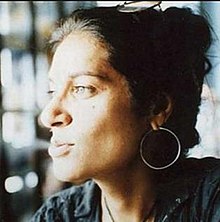Mala Sen
| Mala Sen | |
|---|---|
 |
|
| Born |
3 June 1947 Mussoorie, Uttarakhand, India |
| Died | 21 May 2011 (aged 63) Mumbai, India |
| Occupation | Writer, human rights activist |
| Nationality | Indian–British |
| Spouses | Farrukh Dhondy (1968–76) |
Mala Sen (3 June 1947 – 21 May 2011) was an Indian-British writer and human rights activist. As an activist, she was known for her civil rights activism and race relations work in London during the 1960s and 1970s, as part of the British Asian and British Black Panthers movements, and later her women's rights activism in India. As a writer, she was known for her book India's Bandit Queen: The True Story of Phoolan Devi, which led to the acclaimed 1994 film Bandit Queen. After researching the oppression of women in rural India, she also published Death by Fire in 2001.
Born on 3 June 1947 in Mussoorie in Uttarakhand, Mala Sen was the daughter of Lt-Gen Lionel Proteep Sen and Kalyani Gupta. Following her parents' divorce in 1953, she was brought up by her father. Sen was of Bengali heritage. After attending Welham School in Dehradun, she studied home sciences at Nirmala Niketan College in Mumbai. In 1965 she eloped to England with Farrukh Dhondy who had won a scholarship to Cambridge University. They married in 1968 but divorced in 1976, although they continued to maintain a friendly relationship.
After arriving in England, Sen began working as a seamstress to help to pay the bills. Increasingly taking an interest in race relations, she fought for the rights of Indian factory workers in Leicester. Writing in the journal Race Today, she reported on how Bangladeshis in the East End of London worked in sweatshops while living in dormitories where beds were shared around the clock by shiftworkers. Separated from their Indian families, they did not qualify for housing accommodation as they were listed as single. Together with her husband and other activists, Sen founded the Bengali Housing Action Group, which led to the establishment of Brick Lane as a safe living area for the Bangladeshi community in East London. Along with Dhondy, Sen was also an active member of the British Black Panthers movement.
...
Wikipedia
